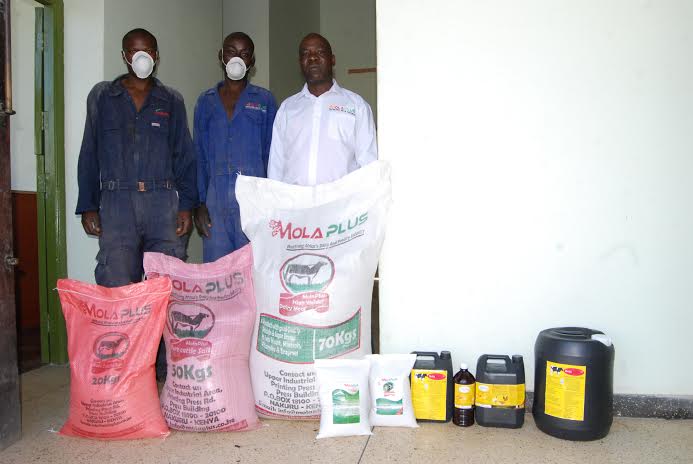Poultry farmers in Kenya are saving up to Sh12,000 on feed costs monthly, increasing the maturity rate of their birds by two and a half weeks and taming the spread of aflatoxins from chicken to humans thanks to a low cost organic supplement that has now caught the attention of Uganda and academic scholars.
Help poultry farmers cut on production costs
Dubbed MolaPlus Poultry Microbes, the solution, which is a form of supplement, is the first of its kind in Kenya and is organic ensuring that the birds and their products are free from chemicals. It has been developed by animal feed manufacturer MolaPlus Limited and comes in the wake of increasing cost of chicken feed and diseases that are taking a toll on poultry farming in the country even as the sector struggles to stoke growing competition from Uganda.
Feeds account for 30 per cent of poultry farmers’ expenses with the cost of preventing and curing diseases taking another 30 per cent. But the unprecedented spike in feed prices in recent years, occasioned by the scarcity of raw materials and competition for grains by poultry and humans, is eating into the farmers’ profits. Farmers are also grappling with diseases as changing weather and poor feeding take a toll on the health and immunity of the birds.
“With the increasing cost of feeds, poultry farmers need a feeding formula that ensures right rations with a good nutritional mix while keeping the birds free from diseases. This is no mean feat,” said Mr. Henry Ambwere the CEO of MolaPlus Limited.
High nutritional value
The MolaPlus Poultry Microbes, a set of beneficial living microorganisms, and which come in the form of liquid, ensure that chicken are able to utilize the feeds faster while consuming less, which increases the bird’s growth rate and weight faster than a chicken relying on feeds alone. The microbes attach themselves to the gut of the bird, additionally creating a protective environment that inhibits attacks from disease causing organisms.
They are mixed with water, at the ratio of five mililitres for every litre of water, once every day.
A farmer is able to save a bag of 70kg feed every week by using the supplement for every 1000 birds. With a 70kg kilo of Layers mash feed going for Sh3, 000 a farmer is able to save Sh12,000 every month.
READ ALSO: How honey reduce heat stress in birds
The microbes also assist chicken reach maturity two and a half weeks earlier than they ordinarily would which reduces the cost of feeding. “With the use of microbes, the chicken reach maturity in four and a half weeks compared to the traditional seven weeks. This has got to do with a host of other beneficial aspects that the microbes produce in the body including Vitamins to boost the bird’s immunity,” Mr Ambwere said. Layers also start laying when they are at the 16th week.
Increase birds' weight by a half kilo under three weeks
A research by the Animal Science department of Egerton University on the MolaPlus Poultry Microbes also found out that the microbes increased bird weight by half a kilo under three weeks. They also assist in strengthening of the egg shell, the yellowing of the yolk and increasing the egg weight.
And at a time when the country is grappling with the aflatoxins menace, microbes are offering a cheaper and more organic solution. Kenya has been classed by the International Livestock Research Institute, ILRI, as one of the world’s hot spots for aflatoxins. But as awareness on the dangers of the highly toxic fungus on humans heightens, farmers have now moved to feeding their livestock on the not properly dried maize, a trend researchers now warn is fanning the fungus transmission from animals to humans through consumption of products like eggs and milk from animals fed on aflatoxin infested maize. Transporting the feeds under conditions where they are exposed to moisture or during poor storage increases the spread.
READ ALSO: Weed that prevent coccidiosis
A recent study by ILRI found out that some of these products had over 90 per cent concentration of aflatoxins which exceeded the 0.05 micro grams per litre requirement limit by the European Union, threatening the livelihoods of the over 21 million Kenyans who rely on poultry for income and diet. In poultry, aflatoxins cause stuntedness of birds, laying of tinny and poorly developed eggs and compromised immunity.
The microbes tames the aflatoxins in poultry by secreting key compounds and antioxidants that scavenge for the aflatoxins and feeds on them making the birds and their products safe for human consumption
High demand for microbes
Such multiple benefits with little investment have caught the attention of poultry farmers even in Uganda. “We have expanded our services to Uganda because poultry farmers there are very keen to minimize on expenses of chicken rearing,” said Mr. Ambwere whose resources on animal nutrition are used by the Animal Nutrition Department of Makerere University and the Africa Institute for Strategic Services and Development, AFRISA, to train Ugandan farmers. Mr. Ambwere is also a frequent guest speaker at the Animal Nutrition Department of Egerton University where he lectures students on feed utilization and formulation.
The growing demand for the company’s microbes has been on meteoric rise in the country, which has seen it increase its outlet network to 1500 stores. “With the prohibitive cost of feeds and poultry medication, farmers are looking for the best way they can cut on these expenses without affecting quality of the birds. They want to remain competitive in the face of growing competition especially from Uganda. Interventions like MolaPlus Poultry Microbes are offering that solution,” said Mr. Ambwere.
For more information, contact Mola Plus Limited on 0722656142

- Hits: 13110
















Comments powered by CComment